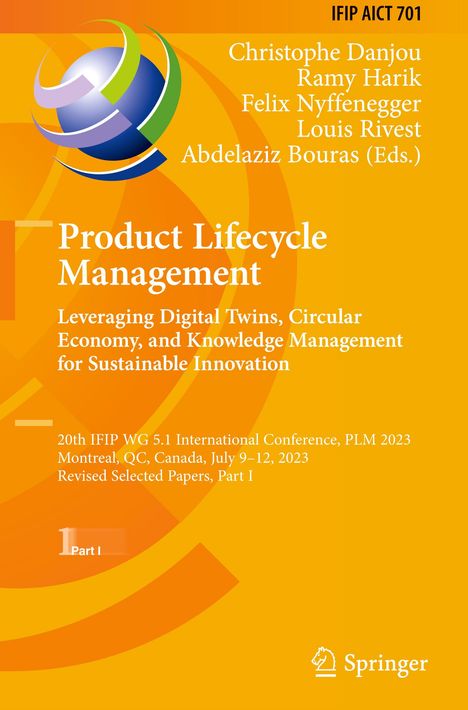Product Lifecycle Management. Leveraging Digital Twins, Circular Economy, and Knowledge Management for..., Gebunden
Product Lifecycle Management. Leveraging Digital Twins, Circular Economy, and Knowledge Management for Sustainable Innovation
- 20th IFIP WG 5.1 International Conference, PLM 2023, Montreal, QC, Canada, July 9-12, 2023, Revised Selected Papers, Part I
(soweit verfügbar beim Lieferanten)
- Herausgeber:
- Christophe Danjou, Ramy Harik, Abdelaziz Bouras, Louis Rivest, Felix Nyffenegger
- Verlag:
- Springer Nature Switzerland, 06/2024
- Einband:
- Gebunden, HC runder Rücken kaschiert
- Sprache:
- Englisch
- ISBN-13:
- 9783031625770
- Artikelnummer:
- 11906692
- Umfang:
- 344 Seiten
- Nummer der Auflage:
- 2024
- Ausgabe:
- 2024
- Gewicht:
- 682 g
- Maße:
- 241 x 160 mm
- Stärke:
- 25 mm
- Erscheinungstermin:
- 28.6.2024
- Hinweis
-
Achtung: Artikel ist nicht in deutscher Sprache!
Weitere Ausgaben von Product Lifecycle Management. Leveraging Digital Twins, Circular Economy, and Knowledge Management for Sustainable Innovation |
Preis |
|---|---|
| Buch, Gebunden, HC runder Rücken kaschiert, Englisch | EUR 120,46* |
Klappentext
This two-volume set IFIP AICT 701-702 constitutes the refereed post-conference proceedings of the 20th IFIP WG 5.1 International Conference on Product Lifecycle Management: Leveraging Digital Twins, Circular Economy, and Knowledge Management for Sustainable Innovation, PLM 2023, held in Montreal, QC, Canada, during July 9¿12, 2023.
The 61 regular papers included in this book were carefully reviewed and selected from 116 submissions.
They are organized in the following thematic sections:
Part I: Technology implementation: augmented reality, CPS and digital twin; organisation: knowledge management, change management, frameworks for project and service development; modelisation : CAD and collaboration, model-based system engineering and building information modeling.
Part II: Circular economy: characterization, criteria and implementation; interoperability technology: blockchain, IoT and ontologies for data exchange; learning and training: from AI to a human-centric approach; smart processes: prediction, optimization and digital thread.



